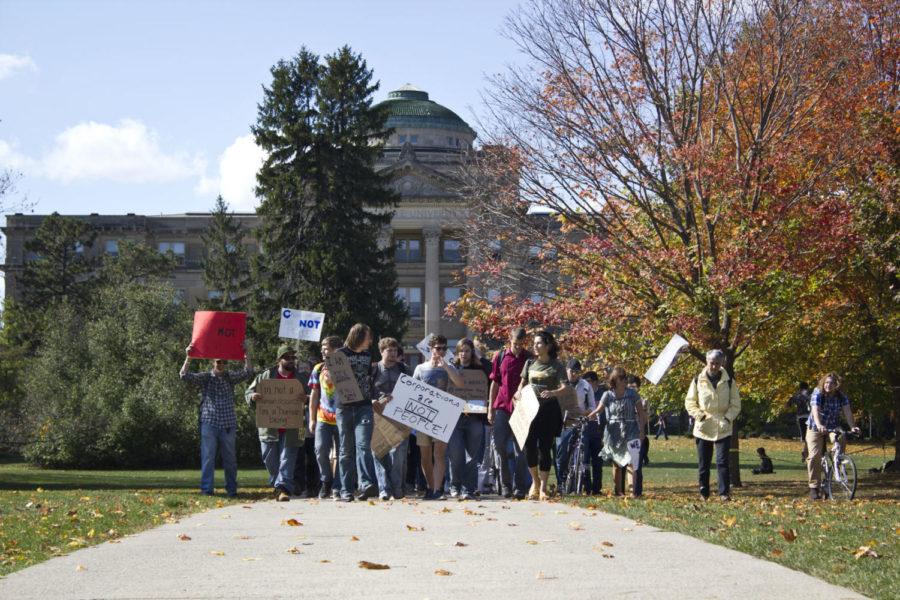Amollo: Protesting for change requires sacrifice
Demonstrators moved from Parks Library back to Central Campus during the Occupy ISU movement. The protesters gathered Thursday, Oct. 13, to voice their concerns about the economy, especially debt from school and financial issues due to job loss.
October 13, 2011
A day after the United States Senate rejected President Barack Obama’s jobs bill, a member of the Greenlee School faculty mentioned something in passing that really hit my conscience. Although the issue unintentionally found its way into our chat, the professor said that she often cuts her students some slack in the classroom “because times have made it really tough on them.”
A native of Europe, she explained how in her college days in her country, it was easy to concentrate and train one’s focus on the possibility of “changing the world” uninterrupted because “we had a system that guaranteed free education and health care. Besides, I didn’t have to work a job or two to see myself through college like most of these kids are forced to. I really feel for them, it’s not easy.”
On the same day, a colleague here at the Daily had an opinion that challenged young Americans — especially students here at Iowa State — to back their disenchantment with a concise approach that crafts a way out and advised students against joining the nationwide Occupy Wall Street bandwagon from where they sit as students. Jessica Bruning suggested that young Americans need not be part of the Occupy hullaballoo just to add numbers. Instead, they must be ready to participate in the electoral process by voting in good leaders or, better still, replacing the bad ones by running for elected office themselves. That much is agreeable.
She then warned students against dumping their Thursday afternoon lectures to be a part of the campus-wide version of the now national Occupy movement. But why? Walking out of the lectures, she said, would be an affront to scholarship as well as a kick in the teeth to professors whose effort and labor would be so demeaned and disrespected. She suggested that by giving up their lessons for the national cause that has gained unexpected momentum, students would be giving credence to the “lazy” stereotype that college kids are subjected to these days.
I don’t radically depart from Bruning’s view. But I would like to break ranks with her on this social movement.
Let’s give it to the 99ers. They’ve demonstrated their people power. The Occupy protests have consummated our everyday fears and parlayed them to a platform where they ring prominent to most of America. People are beginning to pay attention.
The protests are a natural response to an economy that has tilted the playing field against its majority — the more than 90 percent of the American population who are hurting more than ever.
But since there is no better way to define a civil way an organic public outcry should play itself out, turning our backs on what’s happening on the streets of America’s soil is not only defeatist — it is equally lame and a precursor to the harsh judgments that history will accord young people. Social movements are a collective expression by the usually “powerless” people of society. It is the only way with which the working class, the vulnerable of society, and, in our reality, the hurting 99 percent can exercise historical power.
A substantial amount of economic evidence shows that a stable economy rests its head on the foot of the huge chunk of the working class. The wage earners and the factory workers keep the economy running. And the current state of the economy and broken politics has left young Americans with more punctured expectations than ever. Where going to school was once a promise for a great future, hopes have been dwarfed. There is no guaranteed payoff from America’s costlier college education.
This will tell students why they need to be the most fearful; why they need to be leading the Occupy protests; why they need to be prodding elected leaders and calling them out; why they need to be engaged in everyday discourse more than anybody else. Restraint is not an option. Keeping out cannot replace strategy. It never has. It never did at the height of the protests in the late 1960s and the early 1970s. The Vietnam War was halted by American students who organized and protested. Occupy movements across the country are a classic example of how young Americans can lead when the call comes.
In protesting, social movement actors stand up to power in ways that can reform what is amiss in their everyday lives. Theirs is a solidarity that aims at influencing their life circumstances and others in similar situations. Protesting is risky. Something must be given up. For students, that could mean a class, a meal, social time or even, sadly, family time. These protests are, for many people, part of democratic forms of resistance in dramatic and urgent response to grave threats to accustomed, shared patterns of everyday. Existing ways of life and cherished values are being undermined or threatened to the extent that protests by social movements are the only political means available for bringing the attention needed to make leaders appreciate the gravity of such threats.
To secure a better future for college students, someone must stand up to the entrenched business-government elite. Let’s join and occupy; it’s so American. Our disagreements are acceptable.







